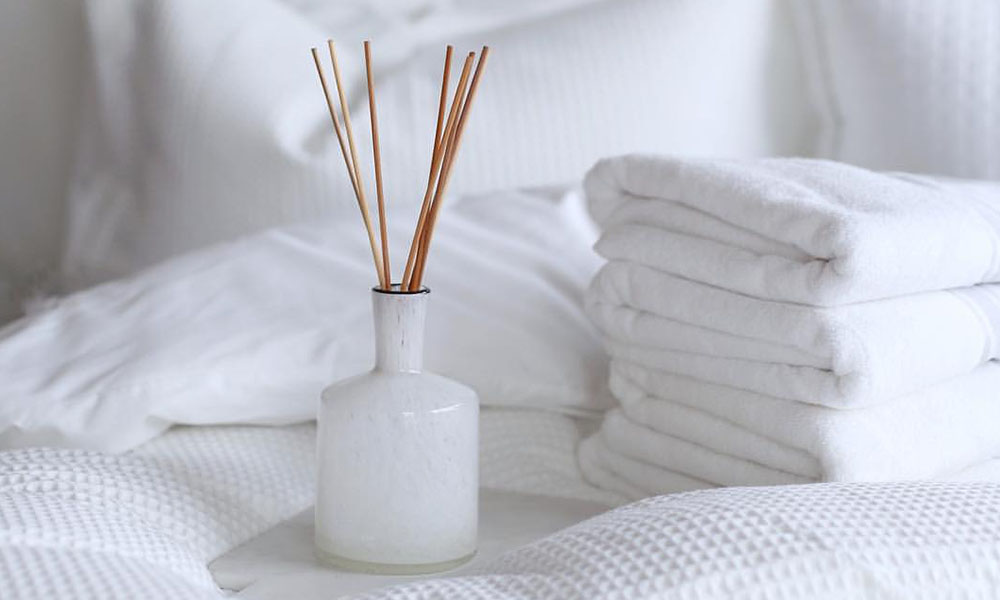A picture may be worth a thousand words, but what about a scent?
Though often underrated, scent is one of the most powerful senses in the human body. Scents have the power to evoke memory, immediately transporting you back in time. What’s more, they have the ability to conjure emotion and can create an ambiance that affects both mood and behavior.
Whether you’re trying to make your house feel more like home, bring life to a dull space, or curate a unique customer experience in your business, do not underestimate the power of fragrance.
Here’s what you need to know about the psychology of scent…
The Power of Olfaction
While sight and hearing are frequently placed at the top of the hierarchy of human senses, smell plays a crucial role in interaction and the understanding of our environment.
The term olfaction refers to the human sense of smell. Like many bodily functions, olfaction occurs involuntarily most of the time. Though you may not realize it consciously, every breath you take activates your sense of smell. Your brain processes and identifies smells using a complex network of olfactory receptors, integrating it with information received through the other senses. The processing of sensory information involves two key regions of the brain: the hippocampus and the amygdala, both of which are related to learning and memory.
While human sense of smell is much less acute than a dog’s, the human sense of smell is by no means weak. Scientists once believed the human brain was only capable of differentiating 10,000 odors but new research suggest the true number may be closer to a trillion.
The odors detectable by humans can be divided into scent categories (often referred to as fragrance families) such as:
- Fresh
- Floral
- Woody
- Fruity
- Gourmand
- Citrus
- Herbal
According to evolutionary psychology, the human nose is most sensitive to scents that pose a potential threat to survival – even scents that are processed subconsciously. For example, most people find it easy to identify the smell of rotting food, but some evidence suggests the human olfactory system may also be able to detect and interpret information from pheromones.
How Can Businesses Utilize Scent Marketing?

Certain smells have near-universal appeal – like the smell of clean laundry – while others have more limited influence because sense of smell is closely linked to memory.
Everyone has different preferences when it comes to fragrance but, by harnessing the connection between scent and emotion or memory, businesses can influence the way customers interact with their products. For example, when you walk into a home improvement store, you’re greeted with the scent of freshly cut lumber. Or, in a home goods store you smell clean linen, evoking feelings of comfort and familiarity.
The term “scent marketing” refers to the process through which businesses utilize the power of smell to build brand loyalty and drive sales. Market research shows that successful scent marketing can increase customer intent to purchase and can even be targeted toward a certain product. For example, gas stations that utilize the scent of fresh coffee may benefit from increased coffee sales.
Here are a few ways to employ scent marketing in your business:
- Use light but pleasant ambient smells to cover unpleasant odor or to distinguish your business from others in a shared space.
- Choose fragrances that evoke memory or emotion relevant to your business (ex: a real estate office might use warm scents like vanilla to create a homey ambiance).
- Utilize a bold and obvious fragrance to create a recognizable scent profile across multiple locations for the same business.
- Curate a unique customer experience by developing a signature scent associated only with your business or product.
The goal of scent marketing is to subliminally communicate with potential customers through their sense of smell. It is important to customize your scent marketing strategy to your business plan and target customer, choose the right scent, and use it in a subtle and harmonious way.
Tips for Using Fragrance at Home

In the same way businesses use scent to curate customer experience, you can use fragrance to alter the ambiance in your home. An uplifting fragrance in the foyer delivers a welcoming first impression for guests while a light and airy scent in the bathroom creates a fresh, clean feeling.
Here are a few ideas for creating ambiance in your home using fragrance:
- Living Room – A warm, homey fragrance can turn your living room into a haven for family time while a bright, citrusy scent can turn up the energy for social gatherings. Try Amber Black Vanilla or Champagne.
- Bedroom – Choose a fragrance on the subtler side – something relaxing you will enjoy being around for long periods of time. Intimate scents like jasmine and soothing scents like lavender work well.
- Kitchen – Eliminate strong aromas with something herbaceous or keep things smelling fresh and clean with a citrus aroma. Try White Grapefruit or Rosemary Eucalyptus.
- Home Office – This is the space where a woody fragrance can induce feelings of comfort or a stimulating scent like clove can help boost concentration and focus. Try a Redwood scented candle.
- Dining Room – Avoid anything too overwhelming – the right scent can neutralize cooking smells without competing with the aroma of the meal. Something like Cilantro Orange or another citrus scent works well in the dining room.
The key to harnessing the psychology of scent is to utilize high-quality fragrance. All LAFCO scents are crafted from pure, essential oil-based fragrance oil. Shop the home fragrance collection or sample a trio of unique scents with the LAFCO Discovery Trio.


